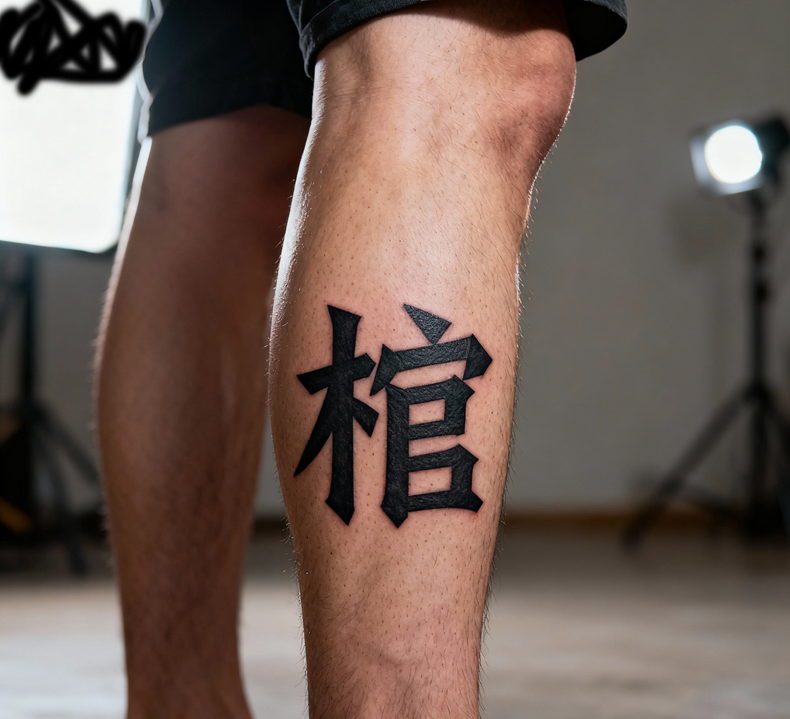
1. Direct Meaning and Composition of the Kanji "棺"
The kanji 棺 (pronounced kan) is a character with a singular, specific, and somber meaning.
Visual Structure: It is composed of two parts:
木 (ki): The "tree" or "wood" radical on the left.
官 (kan): This component means "government" or "official." It primarily provides the sound ("kan"). In this context, it may imply something formal, structured, or pertaining to a final rite.
Core Meaning: The combination creates a clear image. The fundamental and only meaning of "棺" is "coffin" or "casket." It refers to the box in which a dead body is placed for burial or cremation.
2. Common Usages and Deeper Meanings
This kanji is used exclusively in the context of death and funerals.
Primary Usage:
棺 (hitsugi): Coffin, casket.
棺桶 (kan'oke): Coffin (a more colloquial term).
石棺 (sekkan): Stone coffin, sarcophagus.
蓋棺 (gaikan): "Closing the coffin lid." This term is used metaphorically to mean that a final judgment on a person's life or work can only be made after their death.
Deeper Metaphorical Meanings:
Despite its stark literal meaning, "棺" can hold profound, albeit heavy, philosophical symbolism:
Memento Mori (Remember You Must Die): This is the most direct symbolism. A coffin is the ultimate reminder of human mortality. The character can serve as a stark, permanent memento mori, urging the wearer to live meaningfully and consciously because life is finite.
The Finality of Things: The "closing of the coffin lid" (蓋棺) symbolizes an end, a point of no return, or a final conclusion. It can represent the definitive end of a major life chapter, a relationship, or an identity.
Containment and Transition: A coffin is a container that holds the transition between the state of life and whatever comes after (whether that be decomposition, the afterlife, or rebirth). It can symbolize a vessel for a major spiritual or existential transition.
Acceptance of the Inevitable: To wear this symbol is to make a bold statement about accepting the most fundamental and universal truth of existence: death. It represents a confrontation with and acceptance of mortality.
3. "棺" as a Tattoo: Meanings and Cautions
As a tattoo, "棺" is one of the highest-risk choices possible. Its meaning is unambiguous and culturally loaded.
Potential Personal Meanings (The Philosophical Intent):
A Stark Memento Mori: For someone with a deeply philosophical or stoic worldview, it could be a constant, powerful reminder to live without fear and make the most of their limited time.
Marking the End of a Past Life: It could symbolize that a former version of oneself is "dead and buried," perhaps after overcoming addiction, a severe illness, or a traumatic period. It represents a radical rebirth.
A Confrontation with Fear: The tattoo could be the ultimate act of confronting one's own fear of death, a way of domesticating the terrifying by carrying its symbol on one's skin.
Strong Cautions and Negative Connotations (Extremely Important!):
Overwhelmingly Macabre and Negative Connotation: This is the single most important point. To any person, especially in Japanese culture, this tattoo would be perceived as deeply morbid, disturbing, and funereal. It is a symbol of death, loss, and grief. It is not a symbol of life or positive energy.
Severe Social Ostracism and Misunderstanding: This tattoo would likely cause shock, fear, and deep discomfort to those who see it. In Japan, where social harmony is valued and death is often treated with particular reverence and distance, it would be seen as highly taboo and inappropriate. It could be mistaken for a gang-related symbol.
Invitation of Bad Luck: In many cultures, including Japan, symbols associated with death are believed to attract bad luck or malevolent spirits. Permanently marking oneself with a "coffin" could be seen as inviting misfortune.
Potential Association with Mental Illness: Such a tattoo could be misinterpreted as a sign of severe depression, a death wish, or a unhealthy obsession with the macabre.
4. Final Verdict and Recommendation
Under absolutely no circumstances should you get a tattoo of the kanji "棺".
The risks of causing profound social offense, being perceived as mentally unwell, and inviting negative judgment are astronomically high. The philosophical depth of a memento mori is completely and utterly overshadowed by the character's literal and cultural meaning as a funerary object for the dead.
If you are drawn to the concepts of "mortality," "rebirth," or "the end of a chapter," here are powerful and positive alternatives:
For Memento Mori / Impermanence, use 無常 (Mujō - Impermanence) or 寂 (Jaku - Tranquility, from Wabi-Sabi).
For Rebirth and Renewal, use 新生 (Shinsei - New Life) or 復活 (Fukkatsu - Resurrection).
For Transformation, use 変革 (Henkaku - Transformation).
For a Phoenix, use the word 鳳凰 (Hōō).
In summary:
While "棺" can conceptually represent a confrontation with mortality, as a tattoo, it is an exceptionally poor, disrespectful, and ill-advised choice. It demonstrates a profound disregard for cultural sensibilities and social norms. The message it sends is overwhelmingly one of death and despair, not philosophical enlightenment. For the sake of your own social well-being and the feelings of those around you, it is strongly advised to choose any other character from the thousands of beautiful and meaningful kanji available.